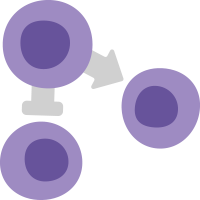
Immune Regulation News
Immune Regulation News is an online resource covering research into the regulation, suppression, and modulation of the immune system.
Regulatory Role of CD39 and CD73 in Tumor Immunity
[Future Oncology] Investigators focus on the role of CD39 and CD73 in immune response and malignant progression, including the expression of CD39 within the tumor microenvironment and its relationship to immune effector cells, and its role in antigen presentation.
B Cells and Atherosclerosis: A HIV Perspective
[Journal of Cellular Physiology] The authors review the multifaceted functions of B cells in atherosclerosis, with a specific focus on HIV. Unique to atherosclerosis is the pivotal role of natural antibodies, particularly those targeting oxidized epitopes abundant in modified lipoproteins and cellular debris.
Dr. Ashley Nelson Receives Hartwell Foundation Individual Biomedical Research Award
[Weill Cornell Medicine] Dr. Ashley Nelson has received a 2023 Hartwell Individual Biomedical Research Award from The Hartwell Foundation. The award provides $100,000 direct cost support per year for three years and designation as a Hartwell Investigator.
QDPR Deficiency Drives Immune Suppression in Pancreatic Cancer
[Cell Metabolism] Scientists demonstrated that the deficiency of quinoid dihydropteridine reductase (QDPR), a critical enzyme regulating biopterin metabolism, caused metabolite dihydrobiopterin (BH2) accumulation and decrease the ratio of tetrahydrobiopterin to BH2 in pancreatic ductal adenocarcinomas.
Jagged2 Targeting in Lung Cancer Activates Anti-Tumor Immunity via Notch-Induced Functional Reprogramming of Tumor-Associated Macrophages
[Immunity] The authors studied the role of the Notch ligand Jagged2 on immune evasion in NSCLC. Higher expression of JAG2 in NSCLC negatively correlated with survival.
Lack of mTORC2 Signaling in CD11c+ Myeloid Cells Inhibits Their Migration and Ameliorates Experimental Colitis
[Journal of Leukocyte Biology] By specific deletion of Rictor in CD11c+ myeloid cells, researchers investigated the role of mTOR complex 2 (mTORC2) signaling in dendritic cell function in mice.
Human NLRC4 Promotes Cancer Survival and Is Associated to Type-I Interferon Signaling and Immune Infiltration
[Journal Of Clinical Investigation] Investigators showed that NLR family CARD Domain Containing 4 (NLRC4) was downregulated in epithelial tumor cells of colorectal cancer patients by using spatial tissue imaging.
Threonine Dehydrogenase Regulates Neutrophil Homeostasis but Not H3K4me3 Levels in Zebrafish
[FEBS Journal] The authors revealed that, in zebrafish hematopoiesis, L-threonine dehydrogenase (tdh) was preferentially expressed in neutrophils.
TNF-α Signals through ITK-Akt-mTOR to Drive CD4+ T Cell Metabolic Reprogramming, Which Is Dysregulated in Rheumatoid Arthritis
[Science Signaling] Researchers investigated whether inflammatory cytokines released by differentiating T cells amplified their metabolic changes. They found that tumor necrosis factor–α (TNF-α) released by human naïve CD4+ T cells upon activation stimulated the expression of a metabolic transcriptome.
MiRNA-148a-Containing GMSC-Derived EVs Modulate Treg/Th17 Balance via IKKB/NF-κB Pathway and Treat a Rheumatoid Arthritis Model
[JCI Insight] Scientists investigated the potential of extracellular vesicles derived from human gingival mesenchymal stem cells as a therapeutic strategy for rheumatoid arthritis.
Evasion of NKG2D-Mediated Cytotoxic Immunity by Sarbecoviruses
[Cell] Researchers found that SARS-CoV-2 evaded NKG2D recognition by surface downregulation of MIC-A/B via shedding, observed in human lung tissue and COVID-19 patient serum.
Regulatory T Cells Limit Age-Associated Retinal Inflammation and Neurodegeneration
[Molecular Neurodegeneration] Investigators evaluated neuroretinal degeneration, gliosis, subretinal space phagocyte infiltration, and retinal pigmented epithelium morphology through immunofluorescence analysis.
For over a decade, Immune Regulation News has been keeping the scientific community up-to-date with the latest research and reviews related to immune regulation. Key research areas covered include the roles of regulatory T cells (Treg cells) in autoimmunity and self-reactivity, as well as immune response to disease, transplantation and cancer. We also provide vital updates on the latest jobs and upcoming events in the field of immunology.

 Cancer Stem Cell News
Cancer Stem Cell News Cell Therapy News
Cell Therapy News Dermal Cell News
Dermal Cell News Endothelial Cell News
Endothelial Cell News ESC & iPSC News
ESC & iPSC News Extracellular Matrix News
Extracellular Matrix News Hematopoiesis News
Hematopoiesis News Hepatic Cell News
Hepatic Cell News Human Immunology News
Human Immunology News Immune Regulation News
Immune Regulation News
 Intestinal Cell News
Intestinal Cell News Mammary Cell News
Mammary Cell News Mesenchymal Cell News
Mesenchymal Cell News Muscle Cell News
Muscle Cell News Neural Cell News
Neural Cell News Organoid News
Organoid News Pancreatic Cell News
Pancreatic Cell News Prostate Cell News
Prostate Cell News Pulmonary Cell News
Pulmonary Cell News
